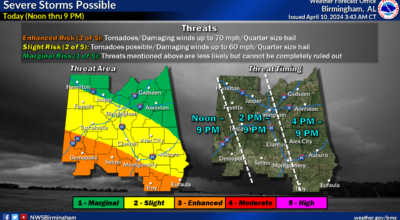Breast cancer affects us all
Published 11:30 pm Monday, October 1, 2012
October not only brings orange and red as the colors of the fall, but it also brings pink, the color of National Breast Cancer Awareness Month.
According to the Alabama Statewide Cancer Registry the cases of breast cancer in Dallas County are greater than the state’s average. Between 2000 and 2009 Dallas County reported 179 black females and 159 white females having breast cancer for a total of 338 cases of breast cancer over the span of 10 years. That data brings Dallas County’s breast cancer rate to 124.8, while Alabama’s rate is 117.3. That’s why it is important to note that there are ways to detect and prevent breast cancer.
Nancy Wright, director of cancer prevention and control for the Alabama Department of Public Health said, “In general, everyone thinks that cancer is a death sentence, and it’s importance to realize that it’s not. With breast cancer, early detection saves lives.”
Wright said the key to surviving breast cancer is detecting it early.
“In order to detect breast cancer early you have to really know your breasts, you have to get clinical breast exams with your physician and you have to get regular mammograms.”
Justin T. George, assistant director for the Statewide Alabama Cancer Registry, agreed and said, “Screening saves lives.”
The screening process, he explained, starts early.
“Breast self-examination starts at age 20. Clinical breast-examination, sometime in your 30s and mammography should start at 40,” he said. “That’s the most recent Breast Cancer Society screening guidelines.”
George added, “If you’ve had any family history (with breast cancer), you’d want to start earlier.”
There are several things that can be done to help detect and prevent breast cancer. Even diet and exercise have an impact on your ability to prevent cancer, Wright said.
“All of these things are decisions we make everyday. So even though we focus on breast cancer in October, we all know someone that’s been affected by some type of cancer,” Wright said. “So for me, it’s a message all the way around – know you can make a difference and protect yourself through prevention and early detection. Go to the doctor and do your routine screening.”
For more information on breast cancer visit adph.org.




